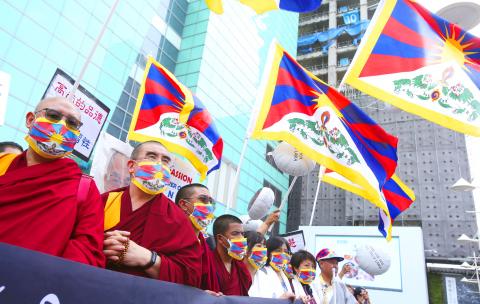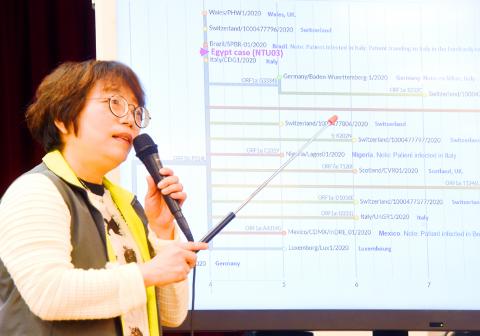Taiwan reported no new cases of COVID-19 yesterday, as the Central Epidemic Command Center (CECC) said that DNA sequencing on the woman who is the nation’s 39th case indicated that she had contracted the virus during a trip to Egypt.
Minister of Health and Welfare Chen Shih-chung (陳時中), head of the center, encouraged Taiwanese to avoid unnecessary travel abroad, saying that the global COVID-19 situation is still concerning, as confirmed cases have been reported in 94 nations, including a total of 7,751 people in Asia, excluding China; 9,365 in Europe and 6,127 in the Middle East.
“The center will continue to pay close attention to the situations in these affected countries and issue travel notices accordingly,” he told a news conference.

Photo: Chiang Ying-ying / AP
“Taiwan is now in 30th place in the number of confirmed cases in each nation, meaning there are 29 countries that have reported more cases than us,” Chen said. “Being in Taiwan is relatively safe, so people should avoid visiting places with a greater risk of infection.”
The Egyptian Ministry of Health and Population and the WHO’s regional office on Friday reported a Taiwanese-American woman who took a Nile River cruise as the “index case” of a dozen people on the ship who later tested positive for COVID-19, creating confusion in international media, with some reports calling the woman the “source of infection.”
The woman, who is in her 60s and is Taiwan’s 39th case, developed a sore throat and cough when she visited Dubai and Egypt between Jan. 29 and Feb. 20. She returned home on Feb. 21, and tested positive on Feb. 29.

Photo: Chu Pei-hsiang, Taipei Times
The center on Saturday said a local tour guide was the first from the cruise to develop symptoms, and that DNA sequencing of samples of the virus collected from the woman proved that she had contracted COVID-19 in Egypt.
Yeh Shiou-hwei (葉秀慧), a professor at National Taiwan University’s College of Medicine, said conducting a phylogenetic analysis of the DNA sequence is similar to conducting a “paternity test” on the virus, and the result showed that the virus that the woman contracted was different from the four main DNA sequences found among the other confirmed cases in Taiwan.
The sequence was very close to a clade (line of evolutionary descent) found in Europe, mainly in Italy, but also in cases reported in the UK, Luxembourg and Finland, Yeh said.
Three DNA sequences in the same clade have also been found in Brazil, Mexico and Nigeria, but the people had traveled to Italy, she added.
“The analysis clearly shows that the woman did not contract the virus in Taiwan, but in Egypt and brought it back to Taiwan,” Yeh said. “Science can tell us that the source of infection was not the Taiwanese woman.”
Meanwhile, Chang Shan-chwen (張上淳), convener of the center’s advisory specialist panel, said three more of the 45 confirmed cases in Taiwan were discharged from hospitals yesterday, bringing the number of recovered patients to 15.
The three were the nation’s 18th, 26th and 29th cases, who were all asymptomatic cases and part of three family clusters of infection, Chang said.

The US government has signed defense cooperation agreements with Japan and the Philippines to boost the deterrence capabilities of countries in the first island chain, a report by the National Security Bureau (NSB) showed. The main countries on the first island chain include the two nations and Taiwan. The bureau is to present the report at a meeting of the legislature’s Foreign Affairs and National Defense Committee tomorrow. The US military has deployed Typhon missile systems to Japan’s Yamaguchi Prefecture and Zambales province in the Philippines during their joint military exercises. It has also installed NMESIS anti-ship systems in Japan’s Okinawa

‘WIN-WIN’: The Philippines, and central and eastern European countries are important potential drone cooperation partners, Minister of Foreign Affairs Lin Chia-lung said Minister of Foreign Affairs Lin Chia-lung (林佳龍) in an interview published yesterday confirmed that there are joint ventures between Taiwan and Poland in the drone industry. Lin made the remark in an exclusive interview with the Chinese-language Liberty Times (the Taipei Times’ sister paper). The government-backed Taiwan Excellence Drone International Business Opportunities Alliance and the Polish Chamber of Unmanned Systems on Wednesday last week signed a memorandum of understanding in Poland to develop a “non-China” supply chain for drones and work together on key technologies. Asked if Taiwan prioritized Poland among central and eastern European countries in drone collaboration, Lin

The Chien Feng IV (勁蜂, Mighty Hornet) loitering munition is on track to enter flight tests next month in connection with potential adoption by Taiwanese and US armed forces, a government source said yesterday. The kamikaze drone, which boasts a range of 1,000km, debuted at the Taipei Aerospace and Defense Technology Exhibition in September, the official said on condition of anonymity. The Chungshan Institute of Science and Technology and US-based Kratos Defense jointly developed the platform by leveraging the engine and airframe of the latter’s MQM-178 Firejet target drone, they said. The uncrewed aerial vehicle is designed to utilize an artificial intelligence computer

Renewed border fighting between Thailand and Cambodia showed no signs of abating yesterday, leaving hundreds of thousands of displaced people in both countries living in strained conditions as more flooded into temporary shelters. Reporters on the Thai side of the border heard sounds of outgoing, indirect fire yesterday. About 400,000 people have been evacuated from affected areas in Thailand and about 700 schools closed while fighting was ongoing in four border provinces, said Thai Rear Admiral Surasant Kongsiri, a spokesman for the military. Cambodia evacuated more than 127,000 villagers and closed hundreds of schools, the Thai Ministry of Defense said. Thailand’s military announced that